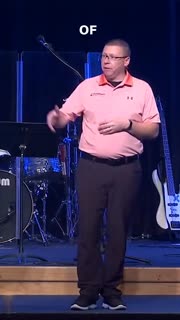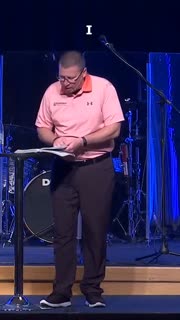Embracing Messiness: David's Journey of Sin and Redemption
Devotional
Sermon Summary
Bible Study Guide
Sermon Clips
### Quotes for Outreach
1. "One of the slogans that I hear you as a church say, I've seen it online, maybe Pastor Jeff says it as well on Sunday mornings, but it's the motto or the slogan, messy is welcome here. I love that. I love that about Hope Summit, that messy is welcome here. That wherever you are at in your life, whether messiness has come into your life of no fault of your own, or you've stepped deep into the messiness, wherever you're at, that you are welcome here." [29:04] (32 seconds)
2. "The reason we plant churches is to reach more people for Jesus. And so we're really excited about that. We're really excited about the doors that will be opened here. You can pray for our existing churches that we have as well, that they would continue to reach more and more people for him." [26:13] (15 seconds)
3. "In light of who Jesus is, you and I are a mess. From the very beginning of the story in the book of Genesis to the very end of the story in Revelation is God's relentless, reckless pursuit after a messy people like you and me. That God wants to, again, come into that messiness and He wants to restore it and make us right with Him. He wants to bring wholeness and freedom into the messiness." [55:30] (30 seconds)
4. "The hope and the good news of the gospel of Jesus Christ is healing and redemption made available by what Jesus did for us. So, Messia is welcome here. Wherever you're at, wherever you've been, whatever baggage you are carrying, it's welcome here. But know that that's not the end of it. That God wants to come into the deepest, darkest, ugliest, messiest places of your life. And He wants to bring what only He can bring, and that is hope and healing and forgiveness." [57:11] (37 seconds)
### Quotes for Members
1. "Caution, David. You're in the wrong place at the wrong time with the wrong thoughts, with the wrong attitudes, and it led to wrong actions. Caution. One pastor said this. He said, sin sucks. It sucks you in, it sucks the joy out of you, and it sucks the life out of you. See, messy is welcome here. Some of us, again, we've created our mess. Some of us, we've inherited our mess. David here inherited this mess." [36:21] (43 seconds)
2. "How many times do we leave a wake of destruction when we try to cover up our mess? And this is what happened with David. Not only did Uriah get killed, but several other of his men. This is a messy story. Not only that, but when word comes back to David, look at David's response, verse 25. It says, when they come back to David, they say Uriah died and several other men. And David says, well, tell Joab not to be discouraged. The sword devours this one today and that one tomorrow. Fight harder next time and conquer the city." [41:56] (49 seconds)
3. "Do you have somebody in your life like that? Because what we see here from this scripture passage is that David did not listen to the Holy Spirit. He did not listen to his own conscience, but he listened to Nathan the prophet. Do you have a friend who will do that for you? Who will call you on the carpet when you begin to live and act in a way that is not according to the values of God? That you say you uphold, that will call you out when you are living misaligned to God's word in your life. We all need somebody like that." [50:50] (34 seconds)
4. "Here's the bottom line, is that confession opens the door to God's grace and His forgiveness. See, this is what God wants ultimately to happen to our messiness. Messy is welcome here, but God wants to do something with the messy. God wants to bring His, grace and forgiveness into our messy. He wants to redeem and to restore our messy." [53:55] (27 seconds)
5. "Finally, I confessed all my sins to you and stopped trying to hide my guilt. I said to myself, I will confess my rebellion to the Lord, and you forgave me. All my guilt is gone. Amen? That's what God wants to do with our messiness. Messiness. And because of David's confession, we see God continued to work through David's life. He continued to use David in a mighty and powerful way." [55:30] (31 seconds)
Ask a question about this sermon
1. "One of the slogans that I hear you as a church say, I've seen it online, maybe Pastor Jeff says it as well on Sunday mornings, but it's the motto or the slogan, messy is welcome here. I love that. I love that about Hope Summit, that messy is welcome here. That wherever you are at in your life, whether messiness has come into your life of no fault of your own, or you've stepped deep into the messiness, wherever you're at, that you are welcome here." [29:04] (32 seconds)
2. "The reason we plant churches is to reach more people for Jesus. And so we're really excited about that. We're really excited about the doors that will be opened here. You can pray for our existing churches that we have as well, that they would continue to reach more and more people for him." [26:13] (15 seconds)
3. "In light of who Jesus is, you and I are a mess. From the very beginning of the story in the book of Genesis to the very end of the story in Revelation is God's relentless, reckless pursuit after a messy people like you and me. That God wants to, again, come into that messiness and He wants to restore it and make us right with Him. He wants to bring wholeness and freedom into the messiness." [55:30] (30 seconds)
4. "The hope and the good news of the gospel of Jesus Christ is healing and redemption made available by what Jesus did for us. So, Messia is welcome here. Wherever you're at, wherever you've been, whatever baggage you are carrying, it's welcome here. But know that that's not the end of it. That God wants to come into the deepest, darkest, ugliest, messiest places of your life. And He wants to bring what only He can bring, and that is hope and healing and forgiveness." [57:11] (37 seconds)
### Quotes for Members
1. "Caution, David. You're in the wrong place at the wrong time with the wrong thoughts, with the wrong attitudes, and it led to wrong actions. Caution. One pastor said this. He said, sin sucks. It sucks you in, it sucks the joy out of you, and it sucks the life out of you. See, messy is welcome here. Some of us, again, we've created our mess. Some of us, we've inherited our mess. David here inherited this mess." [36:21] (43 seconds)
2. "How many times do we leave a wake of destruction when we try to cover up our mess? And this is what happened with David. Not only did Uriah get killed, but several other of his men. This is a messy story. Not only that, but when word comes back to David, look at David's response, verse 25. It says, when they come back to David, they say Uriah died and several other men. And David says, well, tell Joab not to be discouraged. The sword devours this one today and that one tomorrow. Fight harder next time and conquer the city." [41:56] (49 seconds)
3. "Do you have somebody in your life like that? Because what we see here from this scripture passage is that David did not listen to the Holy Spirit. He did not listen to his own conscience, but he listened to Nathan the prophet. Do you have a friend who will do that for you? Who will call you on the carpet when you begin to live and act in a way that is not according to the values of God? That you say you uphold, that will call you out when you are living misaligned to God's word in your life. We all need somebody like that." [50:50] (34 seconds)
4. "Here's the bottom line, is that confession opens the door to God's grace and His forgiveness. See, this is what God wants ultimately to happen to our messiness. Messy is welcome here, but God wants to do something with the messy. God wants to bring His, grace and forgiveness into our messy. He wants to redeem and to restore our messy." [53:55] (27 seconds)
5. "Finally, I confessed all my sins to you and stopped trying to hide my guilt. I said to myself, I will confess my rebellion to the Lord, and you forgave me. All my guilt is gone. Amen? That's what God wants to do with our messiness. Messiness. And because of David's confession, we see God continued to work through David's life. He continued to use David in a mighty and powerful way." [55:30] (31 seconds)









